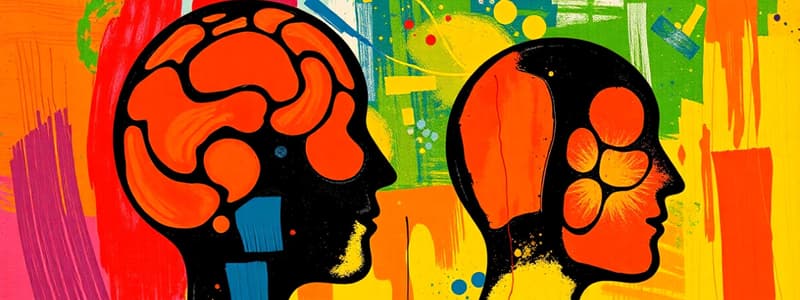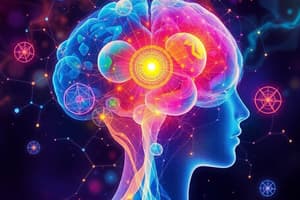Podcast
Questions and Answers
What does psychology study?
What does psychology study?
Behavior, brain, and mental processes.
The four goals of psychology are to describe, explain, predict, and _____?
The four goals of psychology are to describe, explain, predict, and _____?
control
Which of the following is NOT a level of analysis in psychology?
Which of the following is NOT a level of analysis in psychology?
- Physiological
- Genetic (correct)
- Behavioral
- Cultural
The statement 'opposites attract' has been proven by research.
The statement 'opposites attract' has been proven by research.
What is a hypothesis in psychology?
What is a hypothesis in psychology?
Match the following scientific terms with their definitions:
Match the following scientific terms with their definitions:
A _____ is a subset of the population that the investigator studies.
A _____ is a subset of the population that the investigator studies.
Demand characteristics refer to the behaviors expected from participants in a study.
Demand characteristics refer to the behaviors expected from participants in a study.
What does psychology study?
What does psychology study?
Which of the following is NOT a goal of psychology?
Which of the following is NOT a goal of psychology?
Theories help to __________ why certain events co-occur.
Theories help to __________ why certain events co-occur.
Cultural influences play no role in psychological behavior.
Cultural influences play no role in psychological behavior.
Which perspective is NOT listed as a way to analyze behavior?
Which perspective is NOT listed as a way to analyze behavior?
What is a challenge in psychology related to behavior?
What is a challenge in psychology related to behavior?
What is the first step in the scientific method?
What is the first step in the scientific method?
What is a hypothesis?
What is a hypothesis?
Independent variables are affected by dependent variables.
Independent variables are affected by dependent variables.
What is meant by 'external validity' in research?
What is meant by 'external validity' in research?
Match the vocabulary with their definitions:
Match the vocabulary with their definitions:
Flashcards are hidden until you start studying
Study Notes
The Science of Psychology
- Psychology studies behavior (outward actions) and mental processes (internal thoughts and feelings).
Goals of Psychology
- Describe: Observe patterns and data.
- Explain: Develop theories to understand why things happen.
- Predict: Forecast future events based on observations and theories.
- Control: Use validated theories to manage behavior.
Levels of Analysis
- Different perspectives offer unique insights into behavior.
- Cultural: Social influences on behavior (e.g., associating sweets with celebrations).
- Social: Societal factors (e.g., sweets being readily available in social settings).
- Behavioral: Focus on observable actions and their consequences (e.g., accessibility influencing consumption).
- Cognitive: Internal mental processes (e.g., cravings and pleasure associations).
- Physiological: Bodily processes and brain activity (e.g., brain signals triggering cravings).
Challenges in Psychology
- Multiple Determinants: Behavior is influenced by a multitude of interacting factors.
- Interdependent Influences: Psychological factors are not isolated.
- Individual Differences: People vary in their thinking, feelings, and behavior.
- Social Influence: People influence each other's behavior.
- Cultural Impact: Culture shapes behavior in significant ways.
Common Sense vs. Scientific Findings
- Opposites Attract: Research suggests attraction is more common between similar individuals.
- Neuron Loss: Neuroplasticity and neurogenesis suggest that new neurons continue to grow throughout life, even in spite of factors like smoking.
Steps in the Scientific Method
- Observe: Identify a research question.
- Hypothesize: Formulate a testable prediction.
- Test: Gather data to test the hypothesis.
- Analyze: Interpret the data and draw conclusions.
- Disseminate: Present your findings to the scientific community.
Science Vocabulary
- Scientific Theory: A well-supported explanation for a wide range of phenomena.
- Hypothesis: A testable prediction derived from a theory or observation.
- Variable: Any characteristic that can change in value.
- Independent Variable: The factor that is manipulated by the researcher.
- Dependent Variable: The outcome or response that is measured.
- Population: The entire group you want to study.
- Sample: A subset of the population that you study.
- External Validity: The extent to which the study's results can be generalized to the real world.
- Demand Characteristics: Cues in a study that might influence participants' behavior.
- Double-Blind Study: A study where both the participants and researchers are unaware of the group assignments.
The Science of Psychology
- Psychology is the study of behavior and mental processes.
- Behavior is outward actions and reactions.
- Mental processes are internal, covert activities of our minds.
Goals of Psychology
- Describe: Identify patterns in behavior.
- Explain: Develop theories that explain why these patterns occur.
- Predict: Use theories to predict future behavior.
- Control: Use knowledge of behavior to manage or change it.
Levels of Analysis
- Provides different perspectives on behavior.
- Each level offers a different perspective for describing, explaining, and predicting behavior.
- Cultural: Behavior influences from one's culture.
- Social: Behavior influenced by interactions with others.
- Behavioral: Emphasis on learned patterns of behavior.
- Cognitive: Focus on mental processes like thoughts and beliefs.
- Physiological: Focus on biological influences on behavior.
Challenges in Psychology
- Behavior is multiply-determined: influenced by many factors.
- Psychological influences are often interdependent.
- Individual differences in how people think, feel, and behave.
- People often influence each other.
- Culture significantly shapes behavior.
Challenges in Common Sense
- "Opposites attract": Research shows that people are more likely to be attracted to and have long-term relationships with people who are similar to them.
- "Limited number of neurons": Neurons are continuously created throughout life, even in the presence of factors like smoking.
The Scientific Method
- Perceive the question: Observe a phenomenon.
- Form a hypothesis: Develop a prediction based on observations.
- Test the hypothesis: Collect data to test the prediction.
- Draw conclusions: Analyze data and determine if the hypothesis is supported.
- Present results: Communicate findings to the scientific community.
Science Vocabulary
- Scientific theory: An explanation for a wide range of findings in the natural world.
- Hypothesis: A testable prediction based on a theory.
- Variable: Any characteristic that can change in value.
- Independent variable: The variable manipulated by the researcher.
- Dependent variable: The outcome variable measured or recorded.
- Population: The entire group being studied.
- Sample: A subset of the population used in the study.
- External validity: The extent to which the study reflects real-world situations.
- Demand characteristics: Cues in the study that might influence participants' behavior.
- Double-blind study: Neither participants nor researchers know who is in which group.
Studying That Suits You
Use AI to generate personalized quizzes and flashcards to suit your learning preferences.



